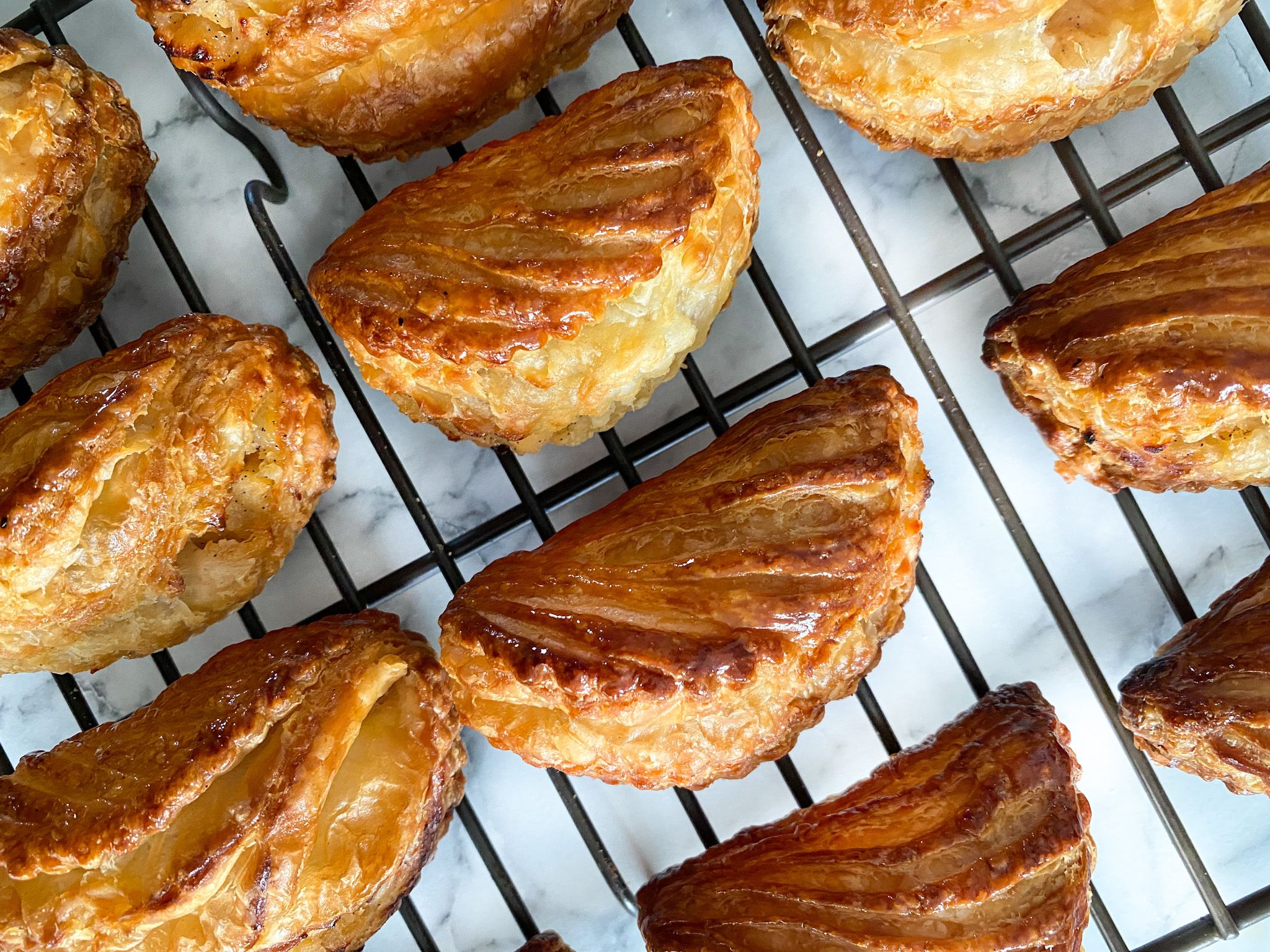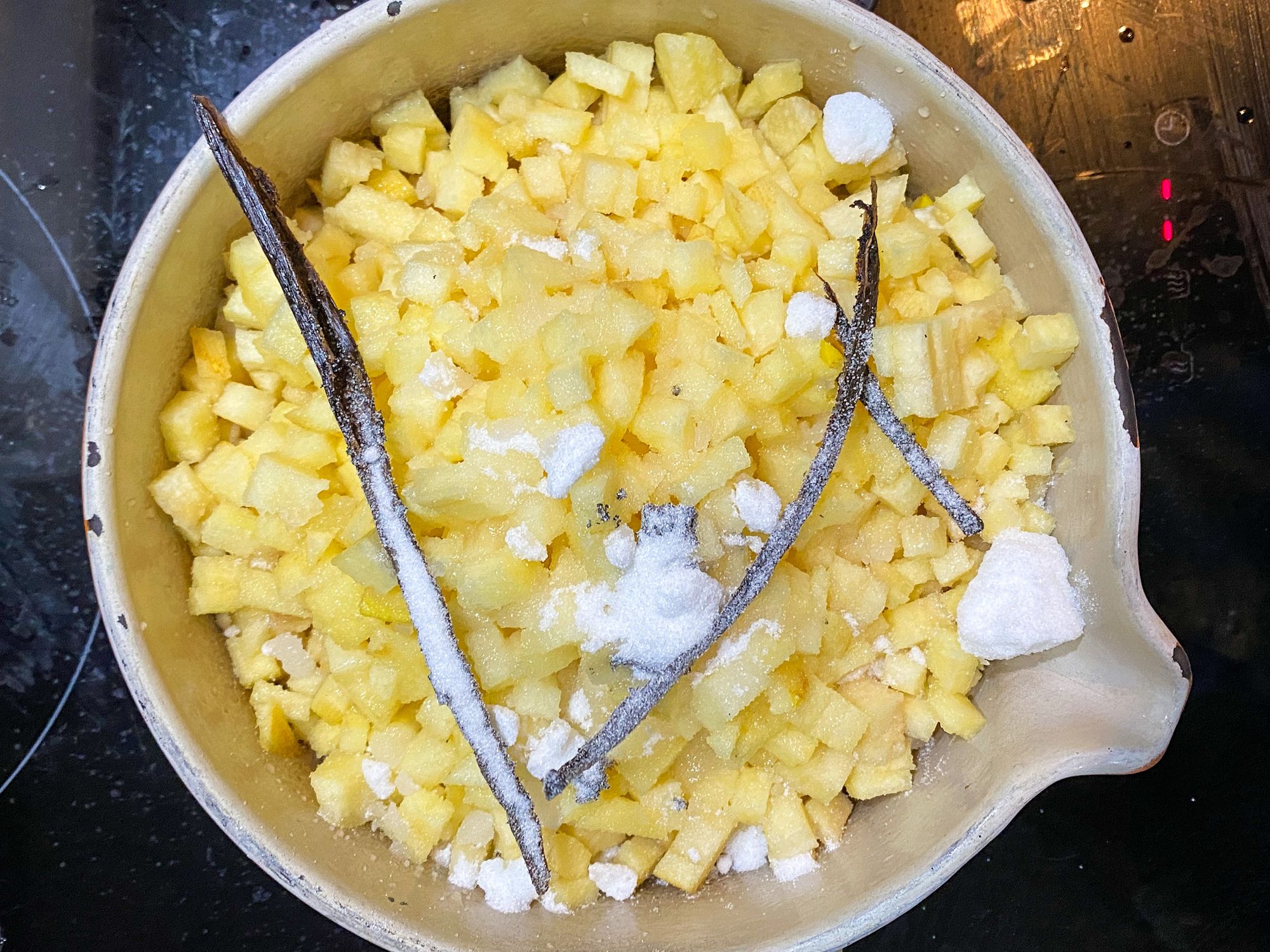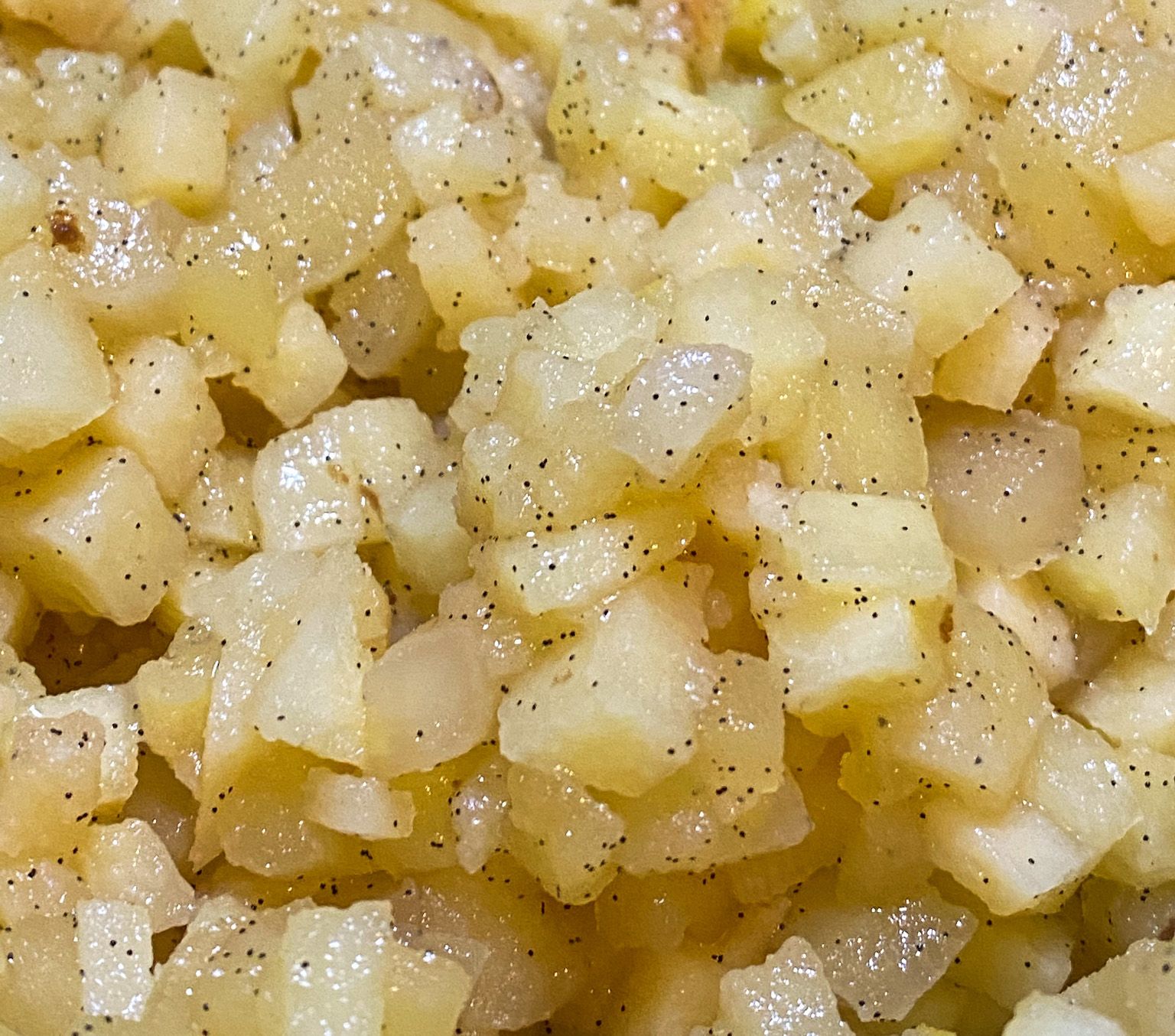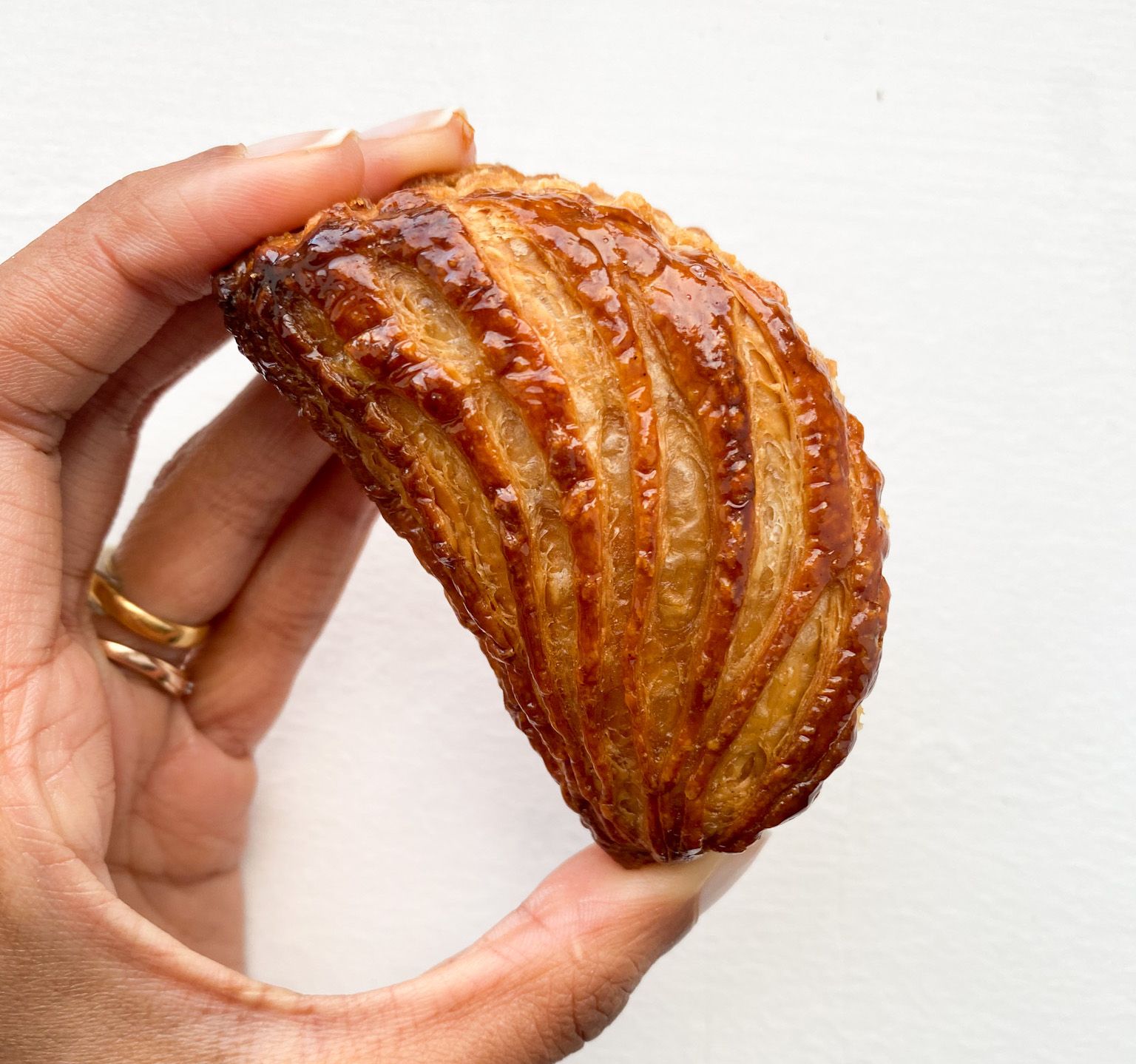
A recipe for puff pastry, and your life
Good pastry derives from a good recipe. Great pastry relies on a good recipe plus a cook's intuition on how to use that recipe. How do you know when the dough is mixed enough, wet enough, dry enough, supple enough? How do you really know when it's really ready?
The first time I made puff pastry in our London flat, it was real bad. I couldn't get the butter block into a proper rectangle, so I couldn't fold the dough over evenly. There were gaping holes of butter that smeared the counter; layers that collapsed into one another; bits and bobs stuck to my rolling pin that I didn't know what to do with. It tasted fine when baked (it's hard for something to not taste good when it's over two-thirds butter), but the pastries were uneven and undulated between papery shards and brick-like chunks. Some parts were burnt, others still doughy. And pools of butter had melted out, sizzling as they surfed over the tray, making the bottoms soggy and heavy.
I took no photos and deemed the project a failure.
The next week, I made it again, suspicious that I just didn't follow the recipe properly. When baking at home, I have a tendency to not measure things properly simply because I am lazy, so that must have been it!
It wasn't. Even with the butter in a proper rectangle, I folded and folded to no satisfying avail. The butter became too soft, squishing its way through the base dough and yep, onto the counter and rolling pin once more, and the pastries were good but not great. I wanted great. What was the problem?
Me. I was the problem, it was me.

We all possess intuition, and we use it often—to choose friends, name our child (or pet), fall in love. I'm also convinced that women and people of color have an additional layer of intuition that alerts us of suspicious situations so that we can stay safe in a world that often doesn't want us to be.
Intuition isn't explicitly linear or data-driven. It is an instinct born inside of you that you trust in order to make a decision. At best, it is beautiful, allowing us to flourish and have adventures that society may otherwise narrow their eyes at. At worst, it is terrifying, revealing dark truths about ourselves and people we love. But in order to live a life that is challenging, genuine, and ultimately rewarding, you need not only your intuition but the resolve to hear it and listen to it.
Western cooking culture has hindered our intuition. We're taught to follow recipes and led to believe that without a recipe, you cannot cook. When a recipe doesn't turn out exactly like the photo, we berate the writer for misleading us, exasperated that they wrote a tablespoon of salt instead of a teaspoon and not knowing what either measurement really means anyways.
Social media has made it worse. We throw ourselves to the experts, who by virtue of competing on reality shows, opening franchises, or simply having good lighting and a strong voice, must know more than us. Their cookbooks are sacred tomes from which we cannot deviate. If we don't cook exactly like them, with the same equipment and the same ingredients, we must be wrong. We look outward and as a result, are afraid to look inward at what our own intuition is telling us to do.
It would take someone much smarter and more dedicated than me to trace the origins of culinary intuition-suppression in Western culture. One cursory hypothesis I have is that Western cookbooks are chockfull of details, so much so that without them, we feel a recipe is incomplete. When I read cookbooks published in India, the recipe is often just half a page long, and many recipes don't offer photos of the final product. You rely on the book to guide your cooking but not dictate it, so you are an active participant in creating the dish, using both your body and mind.

Good pastry derives from a good recipe. Great pastry relies on a good recipe plus a cook's intuition on how to use that recipe. When adding ingredients, do you know when it's mixed enough, wet enough, dry enough, supple enough? Unlike savoury cooking, which tends to use a stove top, the oven is a box of hot air and mystery. Once your dish is in there, do you really know when it's ready? Recipes say bake til golden-brown, but what the hell actually is golden-brown??
Building this intuition takes practice. Annoyingly (and also wonderfully), it is a skill you hone throughout your life. Life doesn't stay the same, so your intuition has to also adapt to new information and experiences. I knew everything about my San Francisco kitchen—our oven ran ten degrees cooler; the left side was better for rolling out rough but the right side was better for taking photos. Our landlord didn't tell me those things, nor did any recipe; I figured them out over time and filed them into my culinary brain.
But I no longer lived in San Francisco, so my puff pastry wasn't turning out well because I'd been using an old set of rules that no longer worked. Here in London, salted butter is saltier; my oven is smaller but hotter; it is sweltering in the summer but bitter cold in the winter (there were no seasons in San Francisco). To make this recipe work, I needed new rules.
Cooking is like eating—to fully connect to a dish, you need to use all your senses to experience it. And the best way to train (and retrain) your intuition is to do exactly that. Listen to the KitchenAid beaters get quieter as the chunks of butter emulsify with the sugar. Look at the dough and add more flour if it's too sticky. Feel the layers of butter and flour so you return it to the fridge when it's too soft. Smell the edges of the pastry burn so you lower the oven temperature. And of course, taste each ingredient in the final product so you know how much salt you prefer next time. Don't just follow a recipe; listen to yourself.
Most of the inflection points in my life happened because of me trusting my gut. There was no data telling me to join restaurants, spend a summer in Paris, or move to London. In fact, data would have told me the to do the opposite. Restaurants are a physically and financially thankless world survived by few. Paris is expensive and quitting my job to go there didn't make it any cheaper. Career opportunities and salaries are fewer in London than in San Francisco, and as I mentioned earlier, the weather here is much more unforgiving.
But each of those actions strengthened my agency in the world and allowed me to experience it in a way that worked for me. I was no longer as beholden to society's recipes. I decided which recipe to use and how I wanted to make it. The goal wasn't to match what others were doing, but to forge my own path.

My puff pastry is pretty damn good now, as you can see by the photo of the chaussons (French "slipper" shaped pastries). I use the same recipe I've always used but with a new ingredient added in—intuition. As we close out the year and enter 2023, this feels like a good reminder that when we make all the resolutions and plans and checklists that we're wont to make in these last few weeks of December, let's look inward. What are we doing, and why are we doing it? Let's listen to what our nonlinear self is telling us and let's use all our senses to pick a path forward that makes sense for us.
Personally, I'm not making any resolutions for the new year. I'm just gonna follow life and trust that I will figure it out.
Apple-Quince Chaussons
I opted to use Nicola Lamb's recipe because why mess with success? It's in her newsletter, Kitchen Projects. Give it a read, it's amazing!
For the filling, I created a fragrant mixture of apple and quince. It's cooked just enough so the sugar melts and the fruit pieces soften. The sugar sweetens without overpowering the fruit, and quince is a such a magical fruit, you don't want that flavour to get lost! You can use the leftover fruit atop some ice cream or mixed with granola and yogurt.
Sign up for a paid subscription to get the recipe for the apple-quince filling and the chausson assembly.
Become a paying subscriber to get access to this and future recipes. Nearly all of my content is free, but developing recipes takes a long time and your support allows me to continue my work. Even if you're not much of a cook, subscribing supports my writing as well!
A paid subscription gets you:
- Full archive + all recipes
- Travel guides of where I eat and drink (monthly)
- My gratitude that you are supporting creative endeavours!

